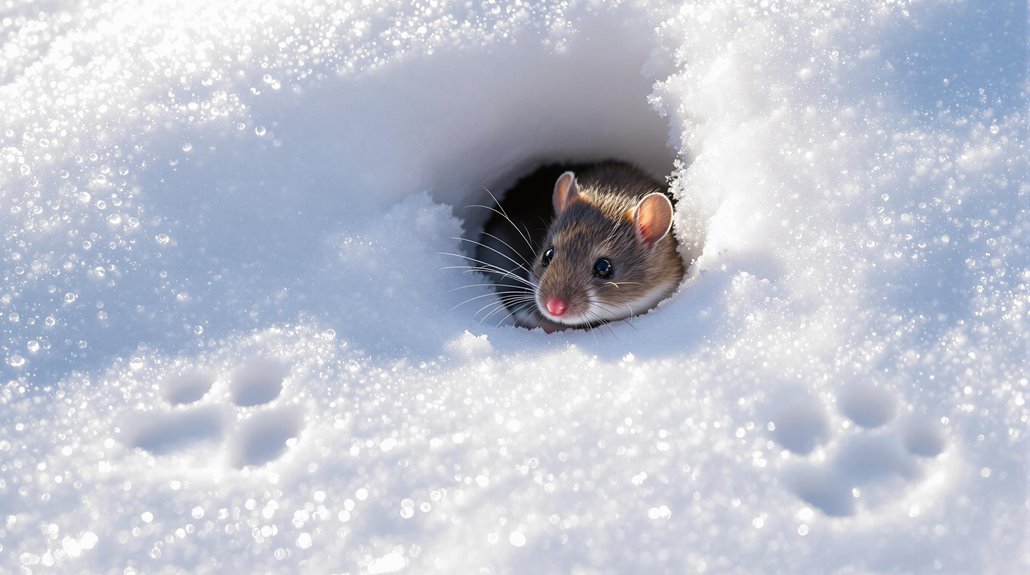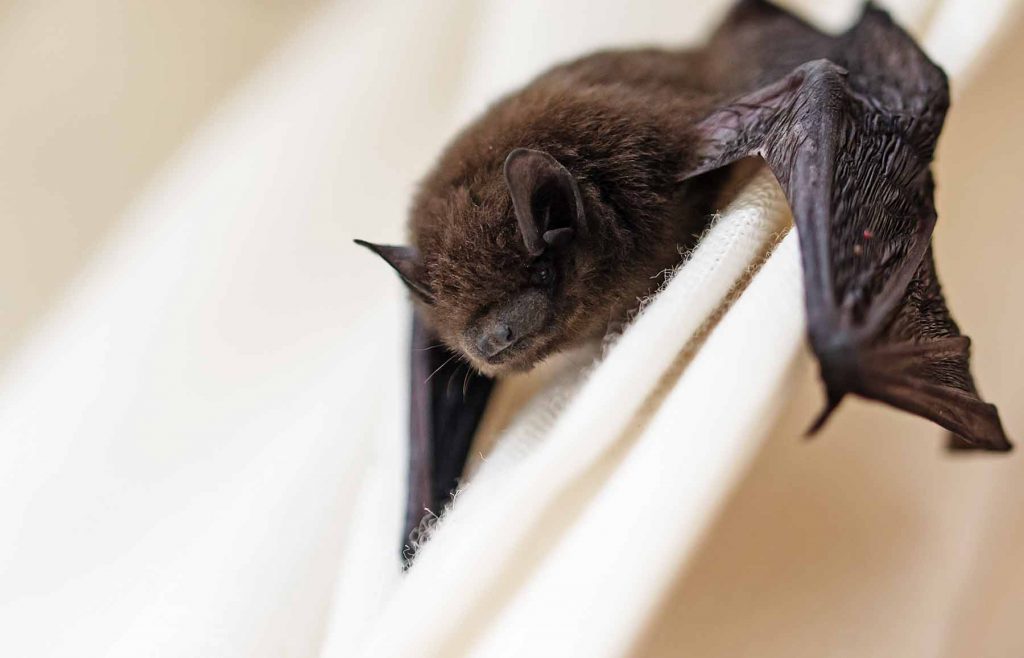In winter, rodent activity in Raleigh, NC, increases as these creatures search for warmth and shelter. Common species include Norway rats, roof rats, and house mice. Signs of infestation often include droppings, gnaw marks on materials, and nesting materials found in hidden areas. The cold weather drives rodents indoors, leading to a higher chance of human encounters. Homeowners can reduce this activity by sealing entry points and storing food in airtight containers. Effective control methods exist for those with infestations. Discovering more about these habits can help you maintain a rodent-free environment during the colder months.
Key Article Highlights
- Rodent mating activity increases in Raleigh as temperatures drop, ensuring offspring are born when food is abundant in warmer months.
- Common rodent species include Norway rats, roof rats, and house mice, seeking warm nesting locations during winter.
- Signs of rodent infestation consist of droppings, gnaw marks, nesting materials, and nocturnal noises.
- Cold weather drives rodents inside homes, where they search for food and shelter, escalating infestation risks.
- Homeowners should seal entry points, maintain cleanliness, and consider traps or professional help to control rodent populations.
Winter Rodent Behavior
Winter Rodent Behavior
As temperatures drop, rodents exhibit notable changes in their behavior to adapt to the winter season. One significant change is in their mating habits. Many rodents will look for mates before the cold sets in. This allows them to produce young that can grow and thrive in the warmer months. They may also adjust their mating timing to guarantee that offspring are born when food is more plentiful.
In addition to mating habits, rodents focus on nesting behaviors during winter. They seek safe and warm places to build their nests. Common nesting spots include inside homes, attics, and basements. Rodents gather materials such as grass, paper, and fabric to create comfortable nests. This provides them with shelter from the cold and protection from predators. Additionally, as their population increases, they can pose significant health risks to humans, making it essential to monitor and manage rodent activity during the winter months. To effectively address these issues, residents should consider professional rodent removal services that can help identify and eliminate infestations.
Common Rodents in Raleigh
Identifying common rodents in Raleigh provides valuable insight into local wildlife. Several rodent species inhabit this area, each with unique characteristics and habitat preferences. The most common include the Norway rat, roof rat, and the house mouse.
The Norway rat favors burrowing in soil and is often found near food sources. It thrives in urban environments, making it a frequent visitor in alleys and basements. Roof rats, on the other hand, prefer elevated areas. They are commonly found in trees and attics, where they can easily access food and shelter.
House mice are small and adaptable, often found in homes, farms, and fields. They tend to nest in hidden corners and are skilled at entering buildings. This diversity in rodent species reflects the varying habitats present in Raleigh.
Each rodent has specific habitat preferences, which influence where they can be found. Understanding these preferences can help residents manage their living spaces effectively. Being aware of the common rodents in the area is essential for anyone interested in maintaining a pest-free environment.
Signs of Rodent Infestation
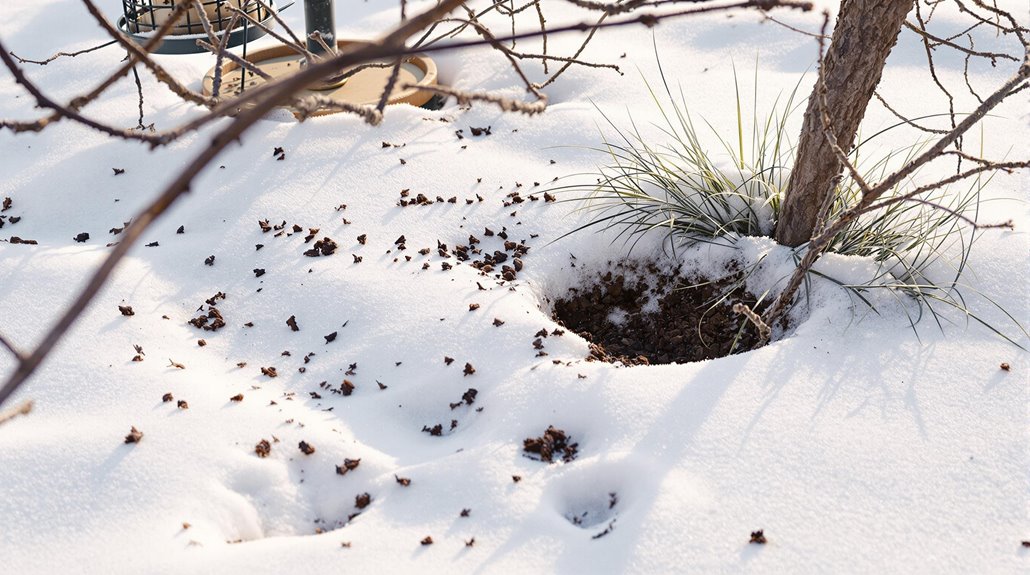
Rodents, once identified in an area, can quickly become a concern if they begin to invade homes or businesses. Recognizing signs of a rodent infestation is essential for taking action. One common sign is droppings, which are often found near food sources or nesting sites. These droppings are small, dark, and resemble grains of rice.
Another indicator is gnaw marks on food packaging, furniture, or walls. Rodents have strong teeth and will chew through various materials to access food. Additionally, you may notice nesting materials, such as torn paper, fabric, or insulation, in hidden corners. These materials are often used to create a nest for their young.
Sounds can also signal a rodent issue. Scratching or scurrying noises, especially at night, suggest that rodents are active in your space. Finally, a musty odor may develop from the presence of rodents, as their urine and droppings can create unpleasant smells.
Factors Contributing to Increased Activity
Several factors lead to increased rodent activity in winter. Temperature fluctuations can drive them to seek warmth, while food scarcity makes them search for available resources. Additionally, rodents often look for shelter to protect themselves from harsh weather conditions.
Temperature Fluctuations
Temperature fluctuations play a crucial role in influencing rodent activity during winter months. As temperatures drop, rodents face temperature extremes that challenge their survival. In response, they exhibit various seasonal adaptations to cope with the changing environment. These adaptations can lead to increased activity as rodents search for warmth and shelter.
The following table summarizes the impact of temperature fluctuations on rodent behavior:
| Temperature Condition | Rodent Behavior | Seasonal Adaptations |
|---|---|---|
| Mild temperatures | Increased foraging | Seeking food sources |
| Cold snaps | Nesting behavior | Building warmer nests |
| Rapid temperature shifts | Increased mobility | Exploring new habitats |
During mild periods, rodents become more active, looking for food and mates. However, during cold snaps, they tend to stay in their nests, conserving energy. When temperatures shift rapidly, rodents may explore new areas for survival. Understanding these behaviors can help in managing rodent populations during winter. To sum up, temperature fluctuations greatly affect rodent activity, driving their seasonal adaptations and survival strategies.
Food Scarcity
Food scarcity greatly influences rodent activity during the winter months. As colder weather sets in, food becomes harder to find for rodents. This leads them to seek out new sources of food, often inside human homes. Rodents are opportunistic feeders, and they will take advantage of any available food storage.
Proper pantry management is important to reduce the risk of rodent infestations. Keeping food in sealed containers is key. Rodents can easily chew through packaging, so using airtight bins can help protect your food supply. Additionally, regularly checking for expired items and discarding them can minimize potential food sources.
Even small crumbs or spills can attract rodents. Maintaining a clean kitchen is essential for food scarcity prevention. Wiping down surfaces and promptly cleaning up any spills can deter these pests.
Moreover, ensuring that waste bins are tightly closed and not overflowing is imperative. Rodents are resourceful and will scavenge for food wherever they can find it. By managing food storage and keeping a tidy environment, homeowners can reduce the likelihood of increased rodent activity during the winter months.
Shelter Seeking
As winter approaches and temperatures drop, rodents instinctively seek shelter to protect themselves from the harsh environment. This behavior is essential for their survival. To withstand the cold, they look for warm nesting locations that provide safety and comfort. Common places include basements, attics, and even inside walls of buildings. Notably, some rodents, like squirrels, are known for their remarkable ability to adapt their nesting habits based on environmental conditions.
Rodents are resourceful when it comes to finding shelter materials. They often gather items like paper, fabric, and insulation to create cozy nests. These materials help them maintain body heat and shield them from predators. In urban areas, garbage and clutter can offer additional nesting locations, making homes a prime target for these animals.
The urge to find shelter drives increased rodent activity during winter months. As they search, they may enter homes through small openings or cracks. Once inside, they can quickly multiply, leading to larger infestations. Understanding this behavior can help homeowners take preventive measures to secure their properties. By blocking entry points and removing potential nesting materials, residents can reduce the likelihood of unwanted rodent guests during the colder seasons. Additionally, effective squirrel removal services can assist in addressing infestations and preventing future issues.
Prevention Tips for Homeowners
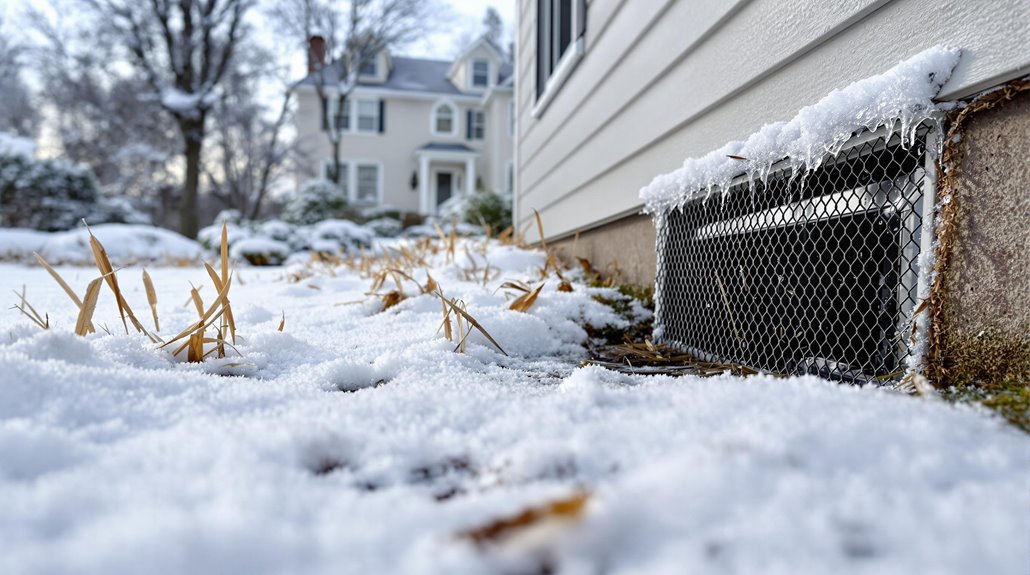
One effective way to reduce rodent activity in winter is to implement preventive measures around your home. Homeowners can take several strategies to protect their properties. Seasonal maintenance is essential, as it helps create a barrier against unwanted pests. Here are some simple tips to take into account:
- Seal cracks and gaps around doors, windows, and foundations.
- Keep food stored in airtight containers to reduce attractants.
- Maintain a clean yard by removing debris, leaves, and standing water.
- Trim trees and shrubs away from the house to limit rodent access.
- Install screens on vents and chimneys to block entry points.
Effective Rodent Control Methods
While preventive measures can greatly reduce the risk of rodent infestations, effective control methods are necessary if pests have already made their way into your home. One of the most common methods is the use of traps. There are various trap types available, including snap traps and electronic traps. Snap traps kill rodents quickly and are easy to set up. Electronic traps also kill instantly and are reusable, making them a good option for homeowners.
Bait stations are another effective method. These stations contain poison bait that attracts rodents. Placed in areas where you see signs of rodent activity, bait stations can help control the population. However, it is essential to handle them carefully, especially if you have pets or children.
Combining these methods can increase effectiveness. For instance, using traps alongside bait stations can catch rodents that may avoid bait. Always check traps and bait stations regularly to verify they are working. Remember, the goal is to regain control of your space while maintaining a safe environment. Taking these steps can help you achieve a rodent-free home during the winter months.
When to Call Professionals
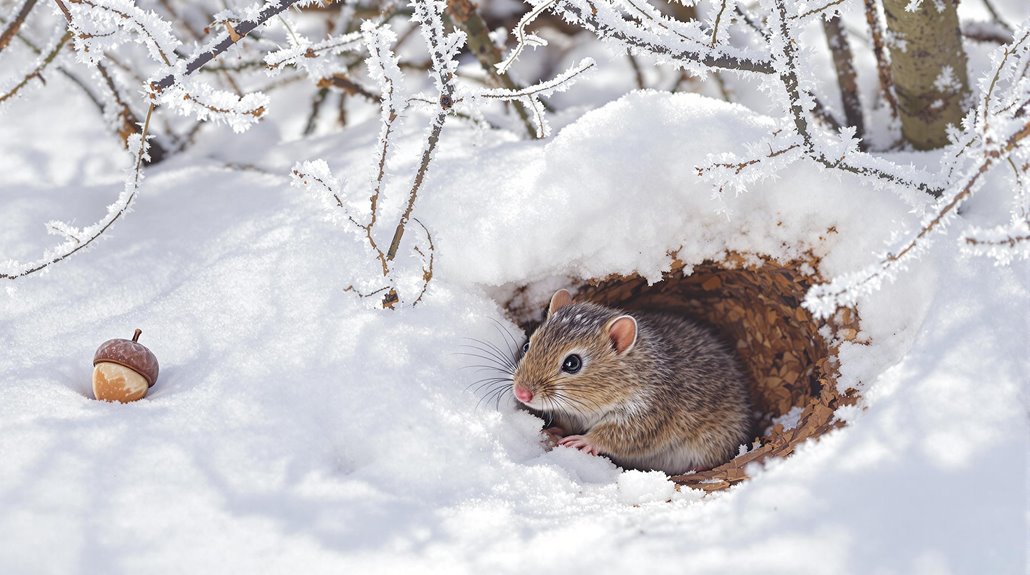
Knowing when to call professionals for rodent issues is important. Look for signs of infestation, such as droppings or nests. If you notice these signs, it is wise to seek help to avoid health risks and guarantee effective prevention. Additionally, seeking help from experts ensures that ethical removal solutions are employed, minimizing harm to the animals involved. Flying squirrels can be particularly challenging to remove due to their nocturnal behavior, making professional assistance even more critical.
Signs of Infestation
Recognizing the signs of a rodent infestation is essential for maintaining a safe and healthy home. During winter, rodents seek warmth and shelter for nesting. Understanding rodent behavior can help you identify if you have a problem. Here are some common signs that indicate an infestation:
- Droppings: Small, dark droppings found near food sources or nesting areas.
- Gnaw marks: Chewed edges on food packaging, furniture, or walls.
- Nests: Shredded materials like paper or fabric used for winter nesting.
- Strange noises: Scratching or scurrying sounds in walls or ceilings, especially at night.
- Footprints: Small tracks in dust or soft materials indicating rodent movement.
If you notice any of these signs, it is time to take action. Ignoring the problem can lead to more significant issues. Calling professionals can help you address the situation effectively. They can assess your home, identify the rodent species, and implement an appropriate control plan. Staying proactive during winter can protect your living space and guarantee your peace of mind.
Health Risks Involved
Rodents pose serious health risks that can affect you and your family. These animals can carry various rodent diseases that may spread to humans. One major concern is zoonotic infections, which are diseases that can be transmitted from animals to people. Common examples include hantavirus and leptospirosis.
When rodents invade your home, they leave behind droppings and urine that can contaminate surfaces. Breathing in dust from these areas can lead to serious health issues. Children and pets are particularly vulnerable to these risks.
It is vital to be aware of the signs of a rodent problem. If you notice increased droppings, strange smells, or any signs of nesting, it is time to act. Do not wait until the problem worsens. If you suspect a rodent infestation, it is advisable to call professionals. They have the knowledge and tools to safely handle these pests, reducing the health risks to your family.
Protecting your home from rodent-related health threats should be a priority. By addressing the issue promptly, you can guarantee a safer living environment for everyone in your household.
Effective Prevention Methods
Addressing rodent issues promptly is vital for health safety. Rodents can cause considerable problems if not managed properly. To prevent rodent infestations, consider the following effective methods:
- Habitat modification: Remove food sources and clutter that attract rodents.
- Exclusion techniques: Seal cracks and holes in your home to keep rodents out.
- Proper waste disposal: Store trash in sealed containers and take it out regularly.
- Regular inspections: Check your property for signs of rodent activity, like droppings or nests.
- Professional help: If an infestation occurs, contacting pest control experts is imperative.
If you notice signs of rodents despite these efforts, it may be time to call professionals. They offer specialized knowledge and tools to handle infestations safely and effectively. Taking these steps guarantees a safer and healthier living space. Remember, prevention is key. By modifying habitats and employing exclusion techniques, you can greatly reduce the risk of rodent activity in your home.
Frequently Asked Questions
Do Rodents Hibernate During the Winter Months in Raleigh?
Rodents do not hibernate in winter. Instead, their behavior adapts for winter survival. They seek shelter and food, remaining active to cope with colder temperatures. This allows them to thrive despite seasonal challenges.
What Is the Lifespan of Common Rodents in Raleigh?
While some rodents thrive in urban environments, others struggle for survival. Common rodents, like mice and rats, typically have a lifespan of one to three years, influenced by breeding patterns and availability of food sources.
Are Certain Rodents More Active at Night?
Yes, certain rodents exhibit nocturnal behavior, resulting in increased rodent activity during nighttime hours. Species like rats and mice are particularly active after dark, seeking food and shelter while avoiding predators.
Can Rodents Cause Structural Damage to Homes?
Rodents can be like silent burglars, stealthily causing structural damage to homes. Implementing effective rodent prevention tips can save homeowners from costly structural repair costs, safeguarding both property and peace of mind. Stay vigilant and proactive.
What Diseases Can Rodents Transmit to Humans?
Rodents can transmit various diseases to humans, including hantavirus, leptospirosis, and salmonella. Effective rodent control is essential for disease prevention, protecting public health, and ensuring a safe living environment for everyone in the community.

